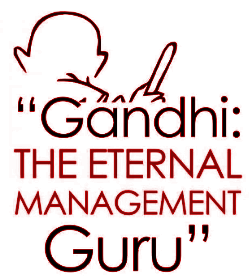“My Life is my Message”
-M.K. Gandhi
“Harvard School of Business Management has crowned him the Management Guru of the 20th century.”

Business leaders across the globe have discovered a new Management icon – Mahatma Gandhi, the Father of the Indian Nation. While leading the nation in the struggle for independence, Gandhi held a beacon to some management strategies which are critical in present day corporate world. The Mahatma is now being rediscovered as more than just a political leader who gained independence for the country. He is being looked upon as a master strategists and an exemplary leader whose ideas and strategies have great meaning for the corporate world, particularly in India.
Mahatma Gandhi was an ideal management guru. Truth and Non Violence were the two key components of his creed. The Mahatma inspired the common man, an average Indian to follow his principles and led the masses to win the fight for independent India. Innovation and creativity, founded on moral authority flowing from his “inner voice” constituted the bedrock of whatever campaign he embarked upon.
Albert Einstein exclaimed: “Generations to come will scarce believe that such a one as this ever in flesh and blood walked upon the earth.”
Gandhi as a Management Guru:
Many associate leaderships with one person leading. Thus, leaders are people who are able to think and act creatively in non-routine situations – and who set out to influence the actions, beliefs and feelings of others. In this sense being a ‘leader’ is personal. It flows from an individual’s qualities and actions.
Gandhi: Theory of Trusteeship linked to Management
- Gandhi offered his Theory of Trusteeship which required capitalists to consider the wealth they had as being held in Trust for the benefit of the poor. The concept of Trusteeship is a mid-path between pure capitalism and pure communism.
- Gandhi said the rich were the Custodians or Trustees of the wealth they earn and that this was to be used for the welfare of their less fortunate beings. His theory of trusteeship has the sanction of philosophy and religion behind it. For him, a Trustee is one who self-consciously assumes responsibility for upholding, protecting and putting to good use whatever he possesses, acquires or earns.
- Gandhi believed that people could not be masters or owners but instead they should be caretakers and trustees. A sound social system discourages all forms of exploitation, domination and inequality; and promotes the values of love, truthfulness, cooperation, and solidarity.
Doctrine of Non-Cooperation
- The doctrine of non-cooperation was the genius of Mahatma Gandhi. He believed that even the most oppressive government derived its authority from the consent, implicit though, of the oppressed. If only the people showed resistance and turned their backs on the government, it would collapse and be pauperised, sooner or later.
- For the chief executive of a company, non-cooperation is a stark reminder of the imperative to win the loyalty and goodwill of his employees. A business enterprise cannot be run by coercion and compulsion. Voluntary cooperation by the employees can be secured only by providing adequate opportunities for their self-development and self-management.
Social Orientation – Collectivism
- For Gandhi, the interests of the group are of high importance. He believed that the needs of the community and the service of the poor should always override every selfish or individual interest.
- As mentioned earlier, the purpose of trusteeship was to construct self-contained villages based on self-rule and cooperation. You can compare this to leadership in a team environment. In a purely project based corporation, each team govern themselves.
- The team leader is responsible and accountable for each team member’s work and whether the work is completed on time. Team cooperation is important and essential for a team environment to succeed. Organisations must restructure themselves toward a more equal and fair work place where every worker contributes to the corporate vision.
Gandhi’s Public Relation Network
- Gandhi had an amazing public relations network and a very good relationship with the press. “For instance, the Dandi March. If Gandhi had gone there quietly, it would just not have made an impact. He knew he had to create an event to make an impact and so he took his followers on a march that stirred popular imagination of the time. The march and the symbolic making of salt galvanised the entire country. It shook the British administration. Thus, the effects of the salt march were felt across India.
- Management should focus on the public relation and understand the demand of the society either on management basis or through press. Further align to the welfare of the society as whole.
Transparency
- Truth and transparency are the hallmarks of Gandhian philosophy. This holds good eminently for the business world, too. For a management to be effective and enduring, it has to be an open book, subjecting itself to public scrutiny. Ethics and honesty, by which Gandhi set store, are among the critical elements of a successful business policy.
Conclusion
Though Gandhi lived many years ago, his leadership principles must be considered in order for organisations today to compete in a global market. His high moral standards are what leaders today should strive to achieve. Management gurus emphasise on the faith in Gandhian principles only means good for the country and the business- only if interpreted correctly.
Reference

